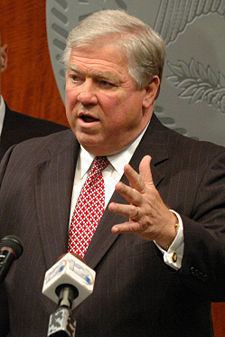Matthew Yglesias's Blog, page 2464
December 21, 2010
Bipartisan Misery

(cc photo by kevindooley)
Robert Farley wades into a comment threat on a conservative blog where people fume about the likely ratification of New START:
The post itself isn't particularly interesting, but the comment thread is fascinating in that it reads almost as a direct mirror image of dozens of comment threads that you'd find on progressives blogs decrying the latest "surrender" by Democratic office holders. I find it fascinating because beliefs in the incompetence of the Democratic party, and a set of related beliefs about the political ruthlessness of the GOP, simply aren't shared by movement conservatives; they believe that the GOP is full of weak-kneed traitors kneeling before Reid/Pelosi/Obama and willing to surrender its most cherished principles etc. etc. etc.
To be sure, I'm not surprised by this; the GOP faithful have demonstrated an admirable (?) willingness to destroy any politician who wanders, however briefly, into "moderate" territory. What's interesting is that the subjective interpretations of both progressives and movement conservatives regarding their Congressional delegations are almost identical.
In part, this kind of thing is inevitable in politics. But in part I think it's a psychological pathology that's distinctly caused by some of the odd aspects of our political system. Counter-majoritarianism further exacerbates politicians' natural desire to want to have it both ways. In a more majoritarian system it's more straightforward to assess whether or not elected officials are fulfilling their campaign pledges, so there's a stronger incentive to try to bring your pledges in line with what you can actually deliver.


Even Better Than Campaign Cash
Chad Outler writes about a recent case of dueling letters from senators who favor and oppose ethanol subsidies:

The following charts compare campaign contributions that pro-subsidy senators such as Charles Grassley (R-Iowa) and Tom Harkin (D-Iowa) have received from entities associated with key ethanol stakeholders with contributions to anti-ethanol subsidy senators such as Feinstein. The charts include contributions from Archer Daniels Midland and Monsanto, the largest ethanol producer in the US and the world's largest seed provider. A contribution search at MAPLight.org returned a variety of corn processing and biofuel companies who contributed to the senators, who make up the balance of the charts. Contributions from the categories provided, "Alternative energy products & services" and "wheat, corn, soybeans and cash grain" have been vetted to eliminate contributors who are not directly related to the corn, ethanol and biofuel industries. Category codes provided by the Center for Responsive Politics.
To me this seems like a terrible example to use if you want to persuade people of the corrupting influence of money. Look at Amy Klobuchar and Al Franken. They're not getting much of this special interest cash. And yet, they love ethanol. Presumably this is because of something having to do with Minnesota. The Senators from Iowa are soaking up corn cash, but that's not the reason they take a pro-corn line. They're pro-corn because corn is king in Iowa. Corn interests back Iowa politicians because it's in their interest for Iowa politicians to have as much clout as possible.
It's important to understand this issue correctly, because we need the right institutional change. The big issue here is that a lot of the aspects of our committee system tend to exacerbate problems of interest group capture when we should try to design it to mitigate the problems.


Reapportionment
By that new count, Texas will gain four new seats, Florida will gain two, while New York and Ohio each lose two. Fourteen other states gained or lost one seat. The gainers included Arizona, Georgia, South Carolina, Utah and Nevada, and the losers included Illinois, Massachusetts, New Jersey and Louisiana.
The superficial analysis is that this is good for Republicans. More sophisticated analysis, in fact, also indicates that it's good for Republicans. Something else to note is that the seat-losing states generally aren't actually losing population it's just that around 100 years ago we decided to stop increasing the size of the House of Representatives no matter how big the national population grew.


The Case for Big Cities
From an excellent New York Times Magazine article on urban mathematics:
West and Bettencourt refer to this phenomenon as "superlinear scaling," which is a fancy way of describing the increased output of people living in big cities. When a superlinear equation is graphed, it looks like the start of a roller coaster, climbing into the sky. The steep slope emerges from the positive feedback loop of urban life — a growing city makes everyone in that city more productive, which encourages more people to move to the city, and so on. According to West, these superlinear patterns demonstrate why cities are one of the single most important inventions in human history. They are the idea, he says, that enabled our economic potential and unleashed our ingenuity.
And earlier in the piece:
In recent decades, though, many of the fastest-growing cities in America, like Phoenix and Riverside, Calif., have given us a very different urban model. These places have traded away public spaces for affordable single-family homes, attracting working-class families who want their own white picket fences. West and Bettencourt point out, however, that cheap suburban comforts are associated with poor performance on a variety of urban metrics. Phoenix, for instance, has been characterized by below-average levels of income and innovation (as measured by the production of patents) for the last 40 years. "When you look at some of these fast-growing cities, they look like tumors on the landscape," West says, with typical bombast. "They have these extreme levels of growth, but it's not sustainable growth." According to the physicists, the trade-off is inevitable.
(cc photo by Serge Melki)
I've come to think that places like Phoenix are both over-deplored by their detractors and over-hyped by their "counterintuitive" proponents. Fast-growing sunbelt cities are generally growing fast for the very understandable reason that local policymakers want the cities to grow rapidly. The population of the United States of America is growing, and the rural/metro balance continues its long-term shift in favor of metropolitan areas. The people have to go somewhere. So naturally they wind up going where it's legal to build homes for them. If high-productivity cities insist on preventing increased density in their most desirable neighborhoods, then people will naturally end up in Phoenix or the exurban fringe. This is bad for the environment and bad for the economy and entirely avoidable, but only if the incumbent residents of high-productivity metro areas want to avoid it.


South of the Border
As mentioned in yesterday's "endgame" I'm off this morning to Oaxaca, Oaxaca, Mexico:
I'll be spending the week down there with my girlfriend and her family. They're from Texas, so I'm glad this means I'll be meeting the male Crawfords for the first time in a scenario where they can't bring their guns. Helps take the pressure off. Plus I've never been to Mexico before. Should be fun! Internet access may get sporadic, but I'll try to keep throwing some posts up.


December 20, 2010
Endgame
The world is full of stupid people:
— Dick Durbin hits the filibuster.
— David Keane explains that he kicked Citizens' Council movement out of CPAC: "we kicked [them] out of CPAC because they are racists."
— The conservative worldview.
— Jon Kyl says there'll be no repeal of DADT repeal.
— The effect of falling home prices on small business borrowing.
Heading to Mexico tomorrow morning with my girlfriend, so here's the Refreshments' "Banditos"—a classic flee to Mexico + Star Trek references mid-nineties alt rock sensation.


My Token Moment of Outreach to the Religious Right
Christmas is hard for everyone. But it's particularly hard for people who actually believe in it.
In a sense, of course, there's no better time to be a Christian than the first 25 days of December. But this is also the season when American Christians can feel most embattled. Their piety is overshadowed by materialist ticky-tack. Their great feast is compromised by Christmukkwanzaa multiculturalism. And the once-a-year churchgoers crowding the pews beside them are a reminder of how many Americans regard religion as just another form of midwinter entertainment, wedged in between "The Nutcracker" and "Miracle on 34th Street."
I don't spend a lot of time agreeing with the Christian right about things, but the whining about the secularization of Christmas is a point I sympathize with. If Christmas were more properly religious, then I think people would have absolutely no trouble recognizing why a secular Jewish person might be not-so-excited about it. Then we could move on with our lives. But the transfiguration of Christmas into a largely secular observance has created a dynamic where lack of enthusiasm for the holiday presents itself as a character flaw—you're a "grinch" who's not participating in the "holiday fun" and "Christmas spirit"—in an awkward way. And yet to me no amount of tacky commercialization can really secularize a holiday that has "Christ" right in the name and that's timed to commemorate the birth of Jesus.
Something they did at my high school that I actually thought was clever was gin up a fake late-December non-sectarian celebratory occasion called Candlelighting that happened on the day before the winter solstice. If I got to have my way about everything, we'd follow that lead. There'd be a big national secular holiday where the idea is to have fun and brighten the darkest day of the year with presents and whatnot. Then separately, Christian people who want to engage in a religious observe of Christ's birth would do so. Jews could let Hanukkah sink back into obscurity and observe our real holidays.


Barbour Has a History of Citizens' Council Trouble

An opposition research professional sent me this Nexis clip from Haley Barbour's first gubernatorial campaign:
BYLINE: By EMILY WAGSTER PETTUS, Associated Press Writer
SECTION: State and Regional
LENGTH: 645 words
DATELINE: JACKSON, Miss.
Republican gubernatorial nominee Haley Barbour says he will not ask for his picture to be removed from the national Web site of the Council of Conservative Citizens.
The site for the St. Louis-based group features Confederate flags and has links to articles such as "In defense of racism" and offers books on why the Rev. Martin Luther King Jr. doesn't deserve a national holiday and why Germany should be cleared of the "blood libel of the 'Holocaust."'
Barbour said in an interview Thursday that white supremacist and anti-Semitic views on the CCC site are "indefensible," but he does not want to tell any group it cannot use his picture or statements.
"Once you start down the slippery slope of saying 'That person can't be for me,' then where do you stop?" Barbour said. "Old segregationists? Former Ku Klux Klan like (Sen.) Robert Byrd (D-W.Va.)? You know?
I think the interesting point here is that Barbour wasn't just stumbling blindly into subject matter he didn't understand. He knew perfectly well that these groups were controversial, but he chose to praise their constructive influence on the his hometown anyway.
It's worth noting that it would actually be surprising if Teenage Haley Barbour hadn't been a white supremacist in the early 1960s. In January of 1964, Gallup found that the Civil Rights Act had a 71% approval rating among non-southern whites but just a 20% approval rating among white southerners. I wouldn't condemn anyone for just kind of picking up the local conventional wisdom. But 40-50 years later, it'd be nice for him to show some understanding of what was happening.


Barbour Spokesman Stands By Barbour's Praise of White Supremacist Organization
Speaking to a Weekly Standard reporter recently, Haley Barbour said things had gone pretty smoothly in Yazoo City, Mississippi thanks to the strong influence of a moderate white supremacist organization:
You heard of the Citizens Councils? Up north they think it was like the KKK. Where I come from it was an organization of town leaders. In Yazoo City they passed a resolution that said anybody who started a chapter of the Klan would get their ass run out of town. If you had a job, you'd lose it. If you had a store, they'd see nobody shopped there. We didn't have a problem with the Klan in Yazoo City.
And it's true. The Citizens' Council movement was a moderate alternative to the Ku Klux Klan. Rather than deploying terrorist violence in favor of white supremacy, they used economic boycots. What's more as David Halberstam explained in Commentary, the Citizens' Council movement was narrowly focused on preserving white supremacy. While the Ku Klux Klan was anti-black and anti-semitic, the Citizens' Councils actively sought Jewish members, going so far as to pressure and coerce reluctant southern Jews into joining their crusade against racial equality.
That said, a moderate white supremacist is still a white supremacist, and it's odd of Barbour to be praising a white supremacist organization for its work on racial issues. Eric Kleefeld asked Barbour's spokesman about that:
So, I asked Turner, does Barbour have any comment on the Citizen Council movement's basis in white supremacy, and its work of launching economic boycotts to cut off employment and business for African-Americans who became active for civil rights — including that notable occasion in Yazoo City?
"Gov. Barbour did not comment on the Citizens Council movement's history," Turner responded. "He commented on the business community in Yazoo City, Mississippi."
I asked further about the Citizen Council movement's white supremacist activities, such as the boycotts in Barbour's hometown. "I'm not aware that that's accurate," Turner said. "I'm not aware that he [Barbour] has any statement on that. I'm aware of the statement that he made in context of how he made it."
After being pressed further on whether Barbour's comments about the Citizens Councils were accurate, Turner said: "I'm aware of what the governor said in this interview. I'm not gonna get into the business of trying to twist what the governor said, or to manipulate it."
I think both what Barbour said and the context were pretty clear. In Mississippi in the 1950s and 60s most white people were white supremacists. And within the large and powerful white supremacist community, there was a split between more moderate and more radical factions. The moderates pursued a strategy of economic coercion and the radicals pursued a strategy of violence. There was also a small minority of white proponents of racial equality. In Barbour's home town of Yazoo City, Mississippi the moderate faction of white supremacists had the upper hand. And Barbour thinks the strength of moderate white supremacists helped create a beneficial political atmosphere in his hometown.


ROTC Making a Comeback on Liberal Campuses

A number of universities that initially distanced themselves from the military during the Vietnam Era found that full-scale participation in military recruiting activities violated their non-discrimination policies in an era of consciousness of the claims of gay and lesbian students to equality under the law. With the US Congress moving to repeal Don't Ask, Don't Tell those barriers should fade away. Bill Kristol somehow sees political gold for the right in this:
Though ROTC was kicked off campuses like Harvard, Yale and Columbia before gays in the military was ever an issue, DADT became the excuse offered by those universities in recent years for continuing to discriminate against ROTC. The excuse is gone. One trusts the presidents and trustees of colleges that have been keeping ROTC at arm's length, allegedly because of DADT, will move posthaste to ensure a hearty welcome and full equality for ROTC at their universities. One would expect that patriotic alumni of those universities would insist on quick action. One would hope that prominent individuals, like Yale alum Joe Lieberman, who played so crucial a role in ending DADT, would lose no time in writing president Richard Levin to urge the re-installing of ROTC at Yale, that Crimson alums like Chuck Schumer will be in touch with Harvard president Drew Faust, and that Columbia graduate Barack Obama will weigh in with Fair Columbia's Lee Bollinger.
But the Republican House will also have a role here. It can make its views known to the leaders of universities that receive federal funds; it can enforce the existing Solomon Amendment; it may perhaps want to consider new legislation if universities remain obdurate.
The trouble for Kristol is that even before the weekend was over the presidents of the universities in question were issuing statements expressing their eagerness to for change. These universities are large bureaucratic organizations, and the military is an even larger one, so I expect it'll take a few months to sort out the details in a way that's not unduly disruptive. Currently, for example, MIT plays host to a multi-campus ROTC brigade that includes students from Harvard, Tufts, Wellesley, etc. and I assume you don't want to just disband it overnight.
But even though conservatives are wedding to this narrative about non-discrimination as an "excuse," it was a quite real issue. And as we're seeing, the best way for employers, whether military or civilian, to get on the right side of campus non-discrimination policies is to stop discriminating! When people look back at this period 10, 20, 30 years in the future they'll see that the Solomon Amendment did basically nothing to help improve the military's access to fancy campuses, whereas DADT repeal did a huge amount.


Matthew Yglesias's Blog
- Matthew Yglesias's profile
- 72 followers




